‘Take the Money!!’ and other highlights from the Podesta email leak
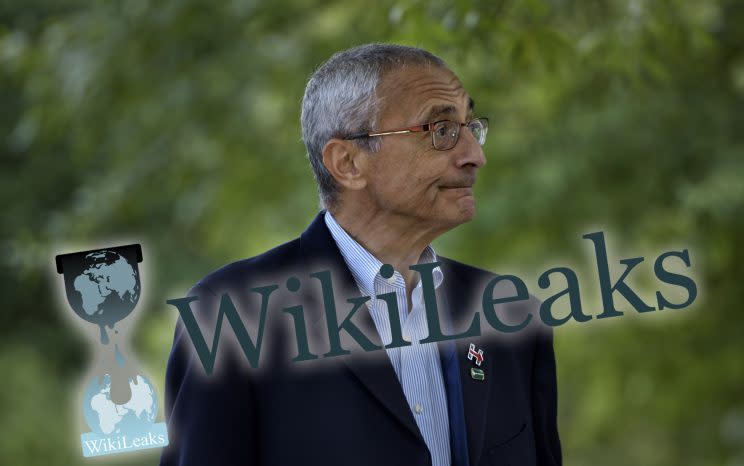
Throughout the Democratic primary, Hillary Clinton’s campaign presented her as a crusading reformer who would take on powerful corporate interests and curb the role of big money in American politics.
But the recent WikiLeaks dump of campaign chairman John Podesta’s emails offers revealing snapshots that tell a somewhat different story. Top aides plot to “scare our people into giving bigger sums.” They debate whether to take cash from registered foreign agents: “Take the money!!” one senior campaign official advises. A top corporate lobbyist, pressed to “hit up” his clients for Clinton campaign coffers, asks for high-level help to advance one of those client’s interests. And there are new details about the overseas cash that rolled into the Clinton Foundation — including a $12 million commitment from the king of Morocco that Hillary Clinton personally helped facilitate.
The emails also disclose just how nervous top Clinton advisers were that Vice President Joe Biden might get into the race (Podesta himself was convinced he was getting in.) And they fretted about their own candidate’s limitations. “Almost no one knows better [than] me that her instincts can be terrible,” wrote one longtime Clinton aide.
The Clinton campaign has refused to confirm the authenticity of the emails, which the U.S. intelligence community has said were leaked as the result of a Russian cyberattack.
Here are six revealing highlights from the Podesta emails that provide a window into how the Clinton campaign operated when it thought (wrongly, as it turned out) nobody was looking.
_____
1. “Use this to scare our people into giving bigger sums.”
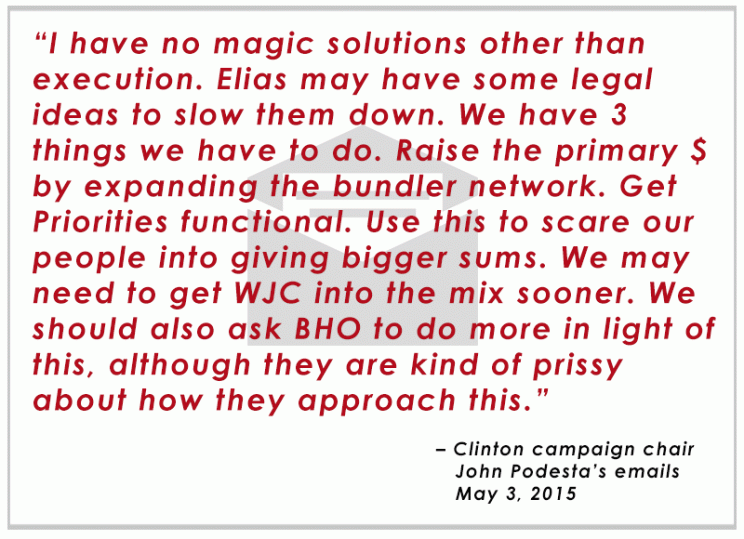
On May 3, 2015, Hillary Clinton got alarmed. She had just read a New York Times story about how the Federal Election Commission was deadlocked cracking down on “election abuse.” Outside super-PACs were being bankrolled by “billionaire donors,” the Times reported. Prospective rivals, like Jeb Bush, were “skirting” finance laws by “raising millions.”
That morning, Clinton forwarded the story to Podesta. “In light of this predictable statement of the obvious, what do you suggest we do?” she wrote. His response: The Clinton campaign should get cracking and ramp up its own outside super-PAC operation. Among “the things we have to do,” he wrote, is “Get Priorities functional.” That’s a reference to Priorities USA Action, the pro-Clinton super-PAC that would soon start collecting seven-figure donations from Democratic-leaning billionaires. (Such super-PACs are supposed to be independent of official campaign committees; the Podesta email shows just how much those lines have blurred.)
And, Podesta recommended, the Clinton campaign should put the Times story to good use. “Use this to scare our people into giving bigger sums,” he writes. And, bring in some big guns. “We may need to get WJC [William Jefferson Clinton] into the mix sooner. We should also ask BHO [President Obama] to do more in light of this, although they are kind of prissy about how they approach this.”
2. “Take the money!!”
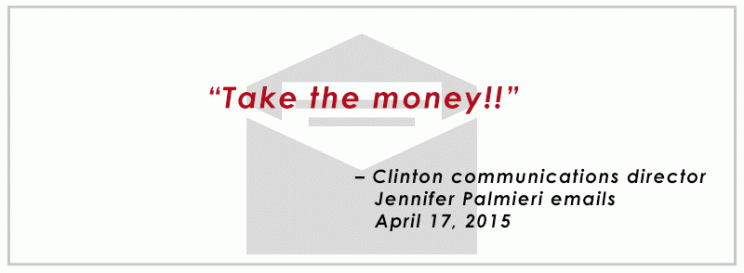
In April 2015, the Clinton campaign was debating a sensitive issue: Should it take cash from “bundlers” (high-dollar fundraisers) who were registered agents for foreign governments and corporations?
President Obama’s campaign had banned donations from all registered lobbyists. The Clinton campaign had lifted those restrictions but was unsure what to do about a particular subset: lobbyists for foreign interests. One campaign official, Karuna Seshasai, wanted a firm policy to reject such cash. But finance director Dennis Cheng noted that would cut off “people we are close with like Tony Podesta” [John Podesta’s brother, whose foreign clients included the governments of India, Cyprus, Albania, and Azerbaijan] and the law firm of DLA Piper [one of whose lobbyists, Clinton fundraiser John Merrigan, represented the United Arab Emirates, Dubai and Turkey.]
“I do want to push back a bit (it’s my job!),” Cheng wrote in one email. “I feel like we are leaving a good amount of money on the table (both for primary and general, and then DNC and state parties)… and how do we explain to people we’ll take money from a corporate lobbyist but not them; that the [Clinton] Foundation takes $ from foreign govts but we now we won’t.”
Campaign lawyer Marc Elias weighed in: “I lean away from a bright line rule here,” he wrote, proposing that “just as we vet lobbyists case by case, I would do the same with FARA” [Foreign Agent Registration Act lobbyists]. He adds: “A total ban feels arbitrary and will engender the same eye-rolling and ill will that it did for Obama.”
The final word in this email thread came from Clinton campaign communications director Jennifer Palmieri (a veteran of the Obama White House.) On April 17, 2015, under the subject “Re: Foreign registered agents,” she wrote campaign manager Robby Mook: “Take the money!!”
3. “They want me to hit up my clients”
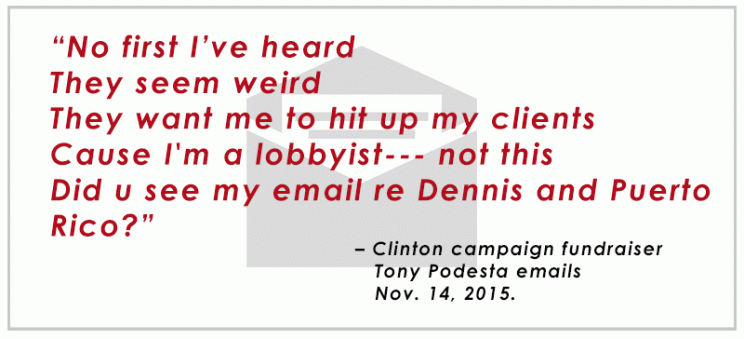
Besides representing multiple foreign governments, Clinton fundraiser Tony Podesta, brother of her campaign manager, also lobbies for a bevy of major corporate interests, including big banks (Wells Fargo), defense contractors (Lockheed Martin), oil companies (BP) and pharmaceutical firms (Merck). On Nov. 13, 2015, John Podesta emailed Tony Podesta an invite for a “Hillary Victory Fund” dinner (with “ a memorable performance by Sting”). The cost: $33,400 per person, $66,800 per couple and $100,000 to be event chair.
“Have you been hit up for this yet?” John Podesta asked his lobbyist brother.
“No first I’ve heard,” Tony replied by email the next day. “They seem weird They want me to hit up by clients Cause I’m a lobbyist– not this.” He then adds “Did you see my email re Dennis and Puerto Rico?”
That was a reference to some help Tony wanted from John on behalf of one of his clients, the governor of Puerto Rico, then facing a financial crisis due to a $72 billion debt load. To fend off its hedge fund creditors, Puerto Rico was seeking bankruptcy protection from Congress and the Obama administration. When John asked him to resend the request, Tony obliged the next day. “Puerto Rico—-we need something in omnibus or we default,” he wrote. “Will u email/call Dennis asking him to see Gov and me.”
“Yes,” John replied the next day.
It’s unclear from the email who “Dennis” is — or whether the meeting Tony Podesta was seeking ever took place. (Juan Hernandez, executive director of the Washington office of Puerto Rico, said that commonwealth governor Alejandro Padilla did have meetings at the White House on the debt crisis, but said he did not know if that included Obama’s chief of staff, Denis McDonough). Still, the email shows the mutually beneficial bond — familial and otherwise — between the Clinton campaign and one of Washington’s most influential lobbyists.
4. “‘Five minutes’ … to present a $1 million check.”

There have been few issues dicier for the Clinton campaign than the huge foreign donations that poured into the Clinton Foundation. In one April 16, 2012, email, a Clinton Foundation official circulates another email reporting that the ambassador of the Persian Gulf monarchy of Qatar “would like to see WJC [William Jefferson Clinton] ‘for five minutes’ in NYC to present a $1 million check that Qatar promised for WJC’s birthday in 2011.”
That hefty donation cast a new light on a previously reported Aug. 17, 2014, Hillary Clinton email to John Podesta laying out her strategy to combat the Islamic State terror group. In that missive, she noted that the same Qatari government (which two years earlier had given the big check to the family foundation) was covertly funding the terrorist group, which she refers to as ISIL (also known as ISIS). “We need to use our diplomatic and more traditional intelligence assets to bring pressure on the governments of Qatar and Saudi Arabia, which are providing clandestine financial and logistic support to ISIL and other radical Sunni groups in the region,” she wrote.
5. “She created this mess and she knows it.“
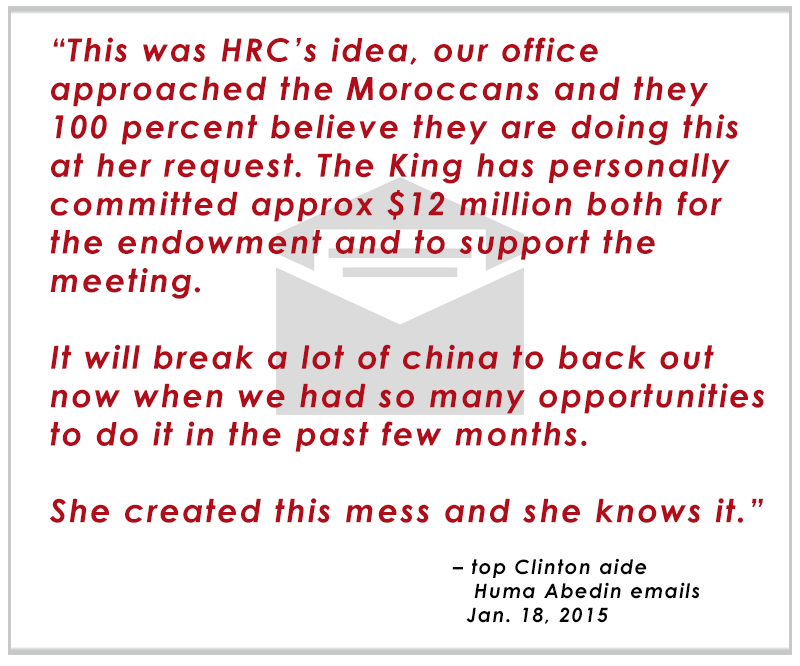
As the Clinton campaign was about to get off the ground in 2015, it was facing an awkward scheduling problem: Hillary Clinton was slated to fly off to Marrakech, Morocco, for a gala meeting of the Clinton Global Initiative. The optics would soon get even worse that spring, when Politico revealed that the meeting was being bankrolled with “at least $1 million” from OCP, a controversial Moroccan phosphate firm.
It turns out that Politico had only one piece of the story. As early as January, while the campaign was still in its “testing the waters” phase, aides were fretting about the Morocco trip, which was scheduled to take place after Clinton would officially declare her candidacy in April. It turns out the Clinton Global Initiative, an arm of her family Foundation, apparently didn’t even want to have a meeting in Morocco, but Hillary Clinton did — and there was a lot more than $1 million at stake. “This was HRC’s idea,” aide Huma Abedin wrote John Podesta and campaign manager Robby Mook on Jan. 18, 2015, adding that “our office approached the Moroccans and they 100 percent believe they are doing this at her request. The King has personally committed approx $12 million both for the endowment and to support the meeting.”
Abedin added: “It will break a lot of china to back out now when we had so many opportunities to do it in the past few months. She created this mess and she knows it.”
In the end, Hillary Clinton did back out of the May trip to Morocco after officially declaring her candidacy on April 12. Bill Clinton went instead. But the Abedin emails shed new light on the role that Clinton herself played in arranging foreign funding for the Clinton Foundation.
6. “Almost no one knows better [than] me that her instincts can be terrible.”

In the fall of 2015, as Clinton was taking fire over her private email server, her top aides were increasingly nervous. It looked to many as if Vice President Joe Biden was about to jump into the race. “Biden will get in,” John Podesta predicted to longtime Clinton adviser Neera Tanden. “We are still way more likely than not to win nomination. We’ve taken on a lot of water that won’t be easy to pump out of the boat. Most of that has to do with terrible decisions made pre-campaign, but a lot has to do with her instincts. She’s nervous so prepping more and performing better. Got to do something to pump up excitement but not certain how to do that.”
Tanden wrote back, offering some reassurance. “You know I’m not a sycophant to you by any means. But the thing that makes me most confident she will prevail is that you are there. Almost no one knows better [than] me that her instincts can be terrible. She does have to give time to allow new things to take hold.”



